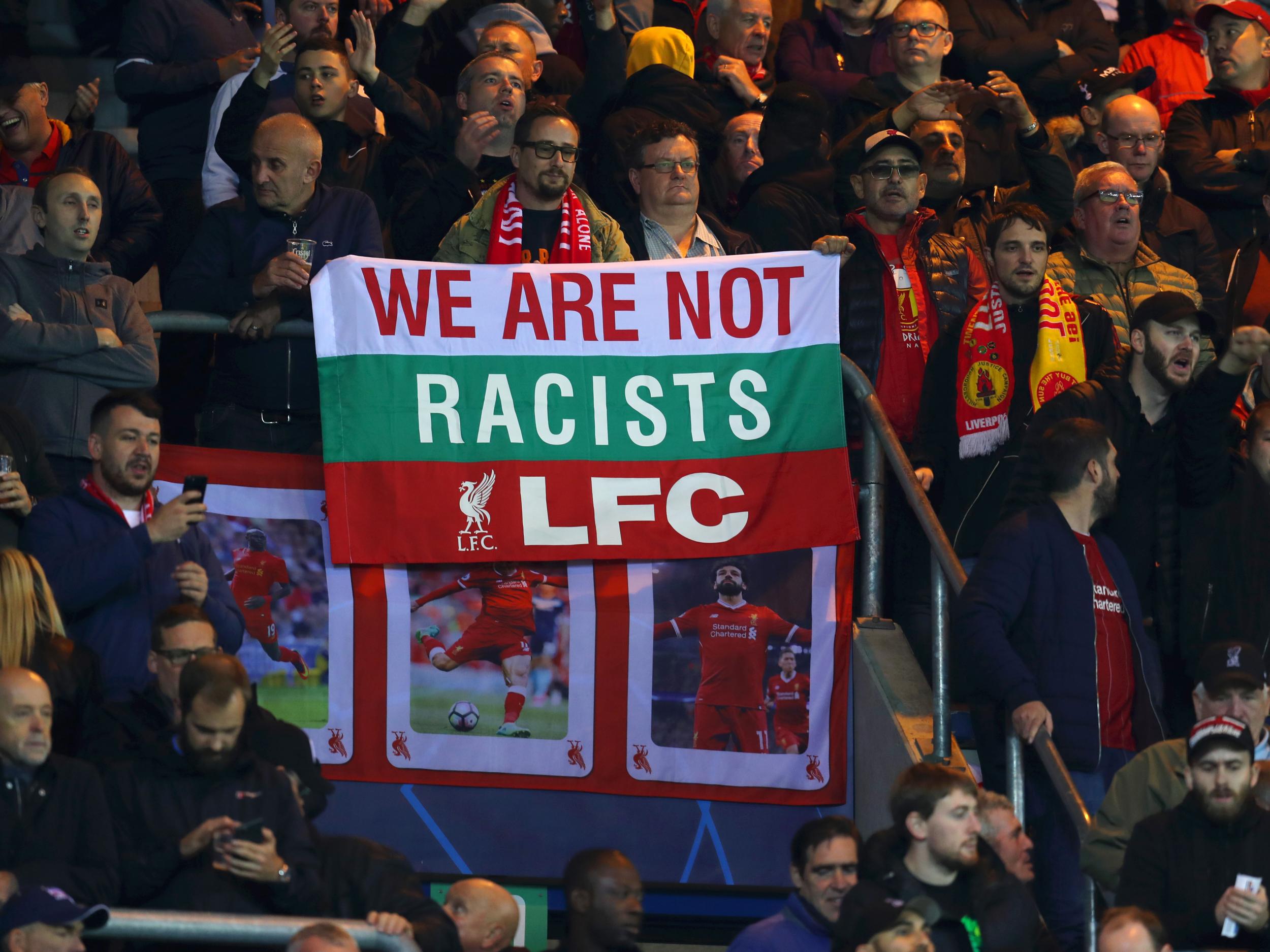Divock Origi banner: Forget the result in Genk – it was another bleak night for Liverpool Football Club
Football, as the biggest expression of working-class culture, plays a huge part in the normalisation of hatred

Your support helps us to tell the story
From reproductive rights to climate change to Big Tech, The Independent is on the ground when the story is developing. Whether it's investigating the financials of Elon Musk's pro-Trump PAC or producing our latest documentary, 'The A Word', which shines a light on the American women fighting for reproductive rights, we know how important it is to parse out the facts from the messaging.
At such a critical moment in US history, we need reporters on the ground. Your donation allows us to keep sending journalists to speak to both sides of the story.
The Independent is trusted by Americans across the entire political spectrum. And unlike many other quality news outlets, we choose not to lock Americans out of our reporting and analysis with paywalls. We believe quality journalism should be available to everyone, paid for by those who can afford it.
Your support makes all the difference.Every week seems to bring a new low in the legitimising of racism in everyday life. Football, as the biggest expression of working-class culture in Britain, plays a huge part in this normalisation of hatred.
Last night in Genk a banner in the Liverpool end featured a caricature of Divock Origi with a huge penis. It was taken down before the match and the club were rightly furious. The response on social media by too many supporters was to suggest that it was merely a play on the striker’s name. The very idea is appalling.
One of the underpinning features of racism is a fear of black men’s sexuality. It was a huge factor in the wave of lynchings that swept through America after the Civil War and way into the 20th century. The NAACP, one of the most significant organisations in the battle for civil rights in the US and an important movement for social justice to this day, says, “Whites started lynching because they felt it was necessary to protect white women.”
Black men are frequently sexualised in an animalistic manner. There is a deep, ingrained fear in bigots that they will “corrupt” the “white race” through miscegenation. It is not about rape or assault. Emmett Till, a 14-year-old, was shot by a mob in Mississippi in 1955 for supposedly whistling at a white woman. The suggestion that black men have a dangerous sexuality has been one of the most corrosive components in race relations. It is a deep, dangerous notion that is lodged in the subconscious of many people. Those who seek to excuse it betray their innate racism.
There will be plenty of people who claim that it is a “positive stereotype.” "Wouldn’t we all love a big penis?" they will ask, as if that legitimises the notion. That is just a smokescreen for bigotry. It’s hard to imagine a white player having his manhood depicted in such a way.
The ‘play on words’ theory is also disturbing. It is not rational to think ‘big cock’ when you hear the name Divock. That should be enough to alert the authorities. There are some worrying antecedents from the past, though.
Liverpool supporters rightly laud John Barnes for the way he faced down the haters and his continuing outspokenness on the subject of racism. Yet some of us were uncomfortable with the nickname given to Barnes when he joined the club in 1987. He was referred to as ‘Digger,’ after a character with the same surname in Dallas, the glossy soap opera. There was always a winking, smartarsedness about the use of the moniker. Everyone was aware of its closeness to the N-word and many were amused by the rhyme. This suggestion will cause howls of outrage but it is nonetheless true. It does not matter that Barnes embraced the nickname; like it or not, there was a provocative element to it.

The Origi banner is indefensible in the same way that Luis Suarez’s treatment of Patrice Evra was outrageously unjustified. Yet some supporters on social media sought to deny the offence and dissemble the reality of the insult. In a week where Jamie Carragher admirable apologised to Evra, the banner is another blow to the reputation of Liverpool supporters. It would be wrong to tar an entire fanbase with the racist brush but it is another worrying sign that insidious currents are at work in football and society.
Liverpool’s support is generally left-wing and inclusive but over the past two years more and more reports have emerged from fans from ethnic minority backgrounds saying that they have been abused because of their race. The club have tried their best to eliminate the wrongdoers but the creeping unpleasantness reflects the growing division in everyday life.
The banner was another depressing moment for a sport that should be uplifting. Ability on the pitch transcends race, religion and sexuality. The way the Kop have embraced Mo Salah and Sadio Mane as Muslims is credit to the supporters. But the Origi flag - and the backing of Suarez - causes one to wonder whether the love for Salah and Mane is real or just because the Islamic players wear the red shirt. Is it really an example of inclusion or just a function of football fanaticism, in the same way that the obsessive urge to justify Suarez’s actions came through red-tinted glasses?
Forget the result in Genk. Last night was another bleak night for Liverpool Football Club.
Join our commenting forum
Join thought-provoking conversations, follow other Independent readers and see their replies
Comments